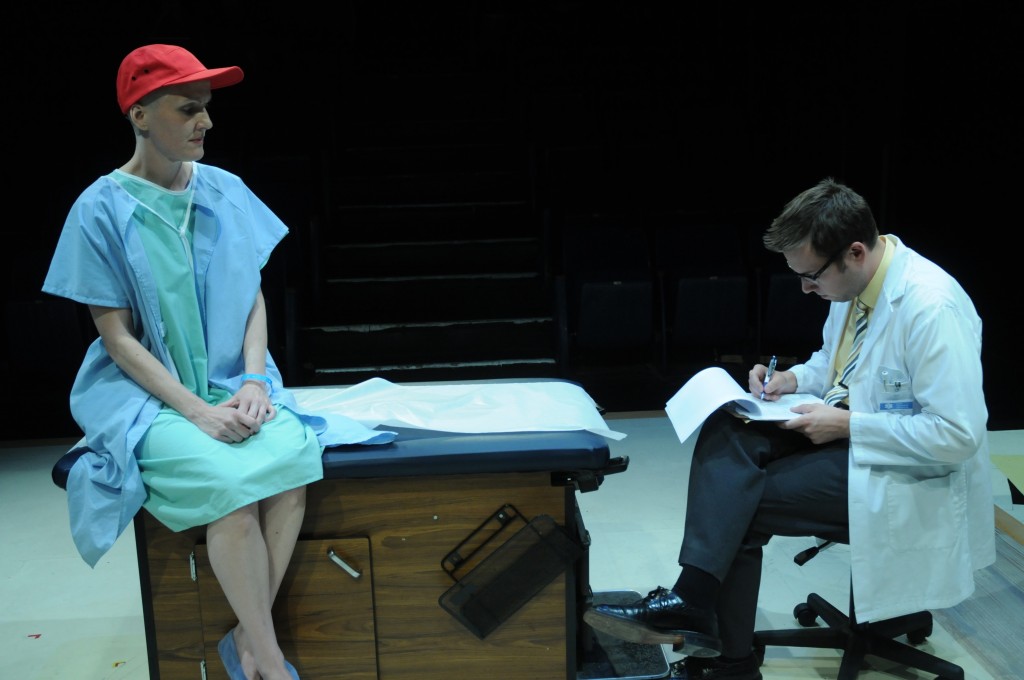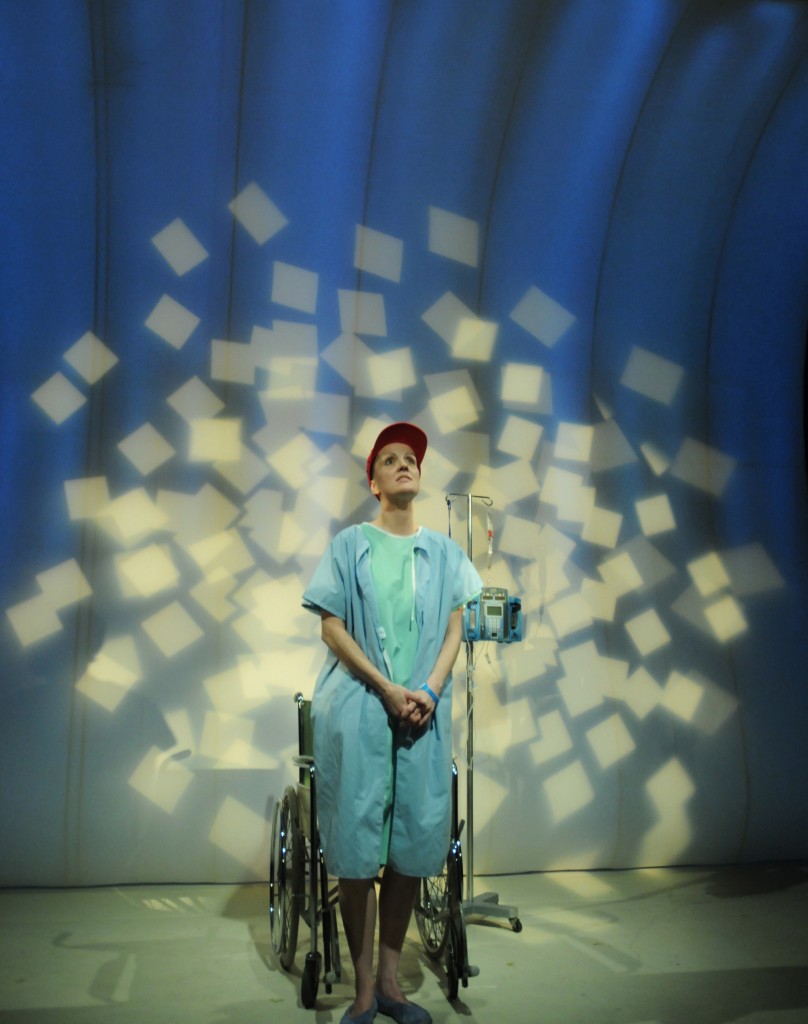
Credit: Damon Calderwood
At Pacific Theatre until June 11, 2016
604-731-5518/pacifictheatre.org
Posted May 24, 2016
Winning the 1999 Pulitzer Prize for Drama for playwright Margaret Edson, W;t is, nevertheless, a difficult play on at least several levels. Professor Vivian Bearing (‘bare-ing’), a renowned scholar of 17th century metaphysical poetry, tells us from her hospital bed, “It is not my intention to give away the plot; but I think I die at the end.” Gaunt, wasted, and bald, she has been experimentally and unsuccessfully treated for Stage 4 metastatic ovarian cancer. That’s how W;t begins. We are going to watch Dr. Bearing die in the next hour and a half.
In the course of the play – in flashbacks – Dr. Bearing lectures her students (and us) on the finer points of John Donne’s discourse on life, death and God as revealed in his Holy Sonnets, particularly Sonnet X, “Death, be not proud”. This is heavy slogging for those of us not as engaged as Dr. Bearing is in the passionate, complicated points of Donne’s speculations on mortality/immortality. Indeed, Dr. Jason Posner, the researcher for whom Vivian Bearing is a ‘lab rat’, took her course years ago at university because he was looking for a challenge.
Amazingly, W;t doesn’t bog down under all this weight; it’s intelligent, witty and sometimes funny. And while the message – pride in scholarship at the expense of human connection leads to a lonely, frightening death – is not profound, it is satisfying.
This Pacific Theatre production succeeds in spite of the play’s difficult material thanks to stellar performances. Head shaved and wearing a bright red baseball cap, Katharine Venour (as Dr. Bearing) is on stage throughout the entire evening; it’s almost an extended monologue. Slowly, carefully, Venour takes Vivian through her journey to self-discovery. “Death be not proud” could also be “Dr. Bearing be not proud” as we watch Vivian struggling with pride juxtaposed with insensitivity to everyone around her.

Credit: Damon Calderwood
Dan Amos, as Dr. Posner, begins well: he’s likeable, straightforward and charming. But director Angela Konrad might have pulled back on Posner’s increasingly transparent tactlessness. It’s in the script but it doesn’t seem likely that Posner would stand at Vivian’s bedside discussing so coldly what is likely to transpire – kidney failure, pain and cardiac arrest – as if she’s not there.
In lieu of family and friends – none of which Vivian has – we all hope someone like Susie (Julie Casselman) and E.M. Ashford (Erla Faye Forsyth) are there to see us through our endgame. While Susie is, by Vivian’s standards, none too bright, Casselman shows us Susie’s abundance of care and tenderness. It’s a big moment of acceptance on Vivian’s part when she doesn’t rankle at Susie calling her “sweetheart”.
Forsyth has us all close to tears when, as E.M., she climbs onto the bed and, rather than reciting something from Donne, she reads from The Runaway Bunny, a present for E.M.’s six-year-old grandson. This scene echoes seven-year-old Vivian reading Beatrix Potter’s The Flopsy Bunny and discovering the word “soporific” which, in turn, echoes Donne’s description of death in Sonnet X: “One short sleepe past, wee wake eternally”.
John Webber’s set – one white, arching wall and another covered in blank pages – evokes both the hospital and the university where Vivian teaches. Lauchlin Johnston lights this set, singling out Venour in her direct addresses to the audience. Corina Akeson’s sound design, beginning with a cello, is beautifully unobtrusive.
Completing the cast are Ron Reed, Julia Siedlanowska, Jess Amy Shead, Brandon Bate and Baraka Rahmani.
Troublesome for some of us, of course, are the two concluding Sonnet X lines: “One short sleepe past, wee wake eternally/And death shall be no more; death, thou shalt die.” Whether or not Vivian Bearing comes to believe in the idea of a hereafter, she does accept, with grace, death’s inevitability.

Light: Lauchlin Johnston
Credit: Damon Calderwood

